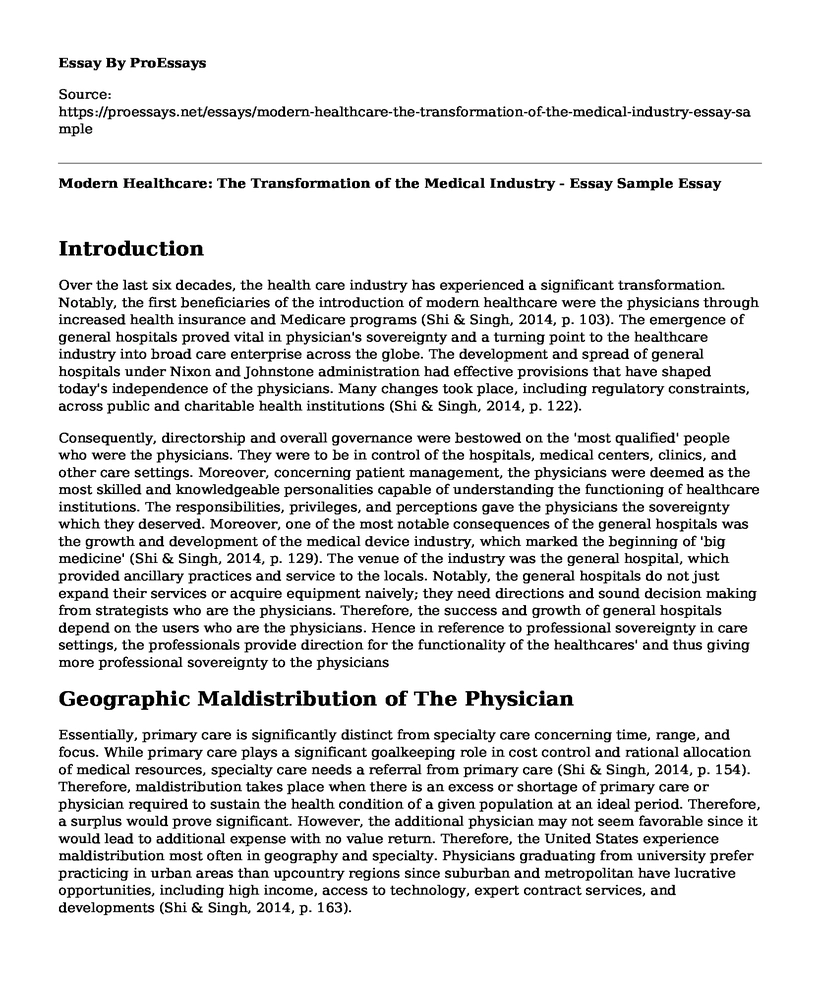Introduction
Over the last six decades, the health care industry has experienced a significant transformation. Notably, the first beneficiaries of the introduction of modern healthcare were the physicians through increased health insurance and Medicare programs (Shi & Singh, 2014, p. 103). The emergence of general hospitals proved vital in physician's sovereignty and a turning point to the healthcare industry into broad care enterprise across the globe. The development and spread of general hospitals under Nixon and Johnstone administration had effective provisions that have shaped today's independence of the physicians. Many changes took place, including regulatory constraints, across public and charitable health institutions (Shi & Singh, 2014, p. 122).
Consequently, directorship and overall governance were bestowed on the 'most qualified' people who were the physicians. They were to be in control of the hospitals, medical centers, clinics, and other care settings. Moreover, concerning patient management, the physicians were deemed as the most skilled and knowledgeable personalities capable of understanding the functioning of healthcare institutions. The responsibilities, privileges, and perceptions gave the physicians the sovereignty which they deserved. Moreover, one of the most notable consequences of the general hospitals was the growth and development of the medical device industry, which marked the beginning of 'big medicine' (Shi & Singh, 2014, p. 129). The venue of the industry was the general hospital, which provided ancillary practices and service to the locals. Notably, the general hospitals do not just expand their services or acquire equipment naively; they need directions and sound decision making from strategists who are the physicians. Therefore, the success and growth of general hospitals depend on the users who are the physicians. Hence in reference to professional sovereignty in care settings, the professionals provide direction for the functionality of the healthcares' and thus giving more professional sovereignty to the physicians
Geographic Maldistribution of The Physician
Essentially, primary care is significantly distinct from specialty care concerning time, range, and focus. While primary care plays a significant goalkeeping role in cost control and rational allocation of medical resources, specialty care needs a referral from primary care (Shi & Singh, 2014, p. 154). Therefore, maldistribution takes place when there is an excess or shortage of primary care or physician required to sustain the health condition of a given population at an ideal period. Therefore, a surplus would prove significant. However, the additional physician may not seem favorable since it would lead to additional expense with no value return. Therefore, the United States experience maldistribution most often in geography and specialty. Physicians graduating from university prefer practicing in urban areas than upcountry regions since suburban and metropolitan have lucrative opportunities, including high income, access to technology, expert contract services, and developments (Shi & Singh, 2014, p. 163).
In reference to specialty maldistribution, upon successful graduation, approximately 42% of the physicians opt for primary related care, while 58% specializes in specific fields. The new growth, transformation, and development of the healthcare industry, including medical technology, has been the driving force under increased demand for specialty care and thus increase in physicians. Similarly, this has translated to more working hours among the physician and thus increased pay (Shi & Singh, 2014, p. 165). Notably, the imbalance between primary and specialty care has been caused by many specialists contributing to both intensive and expensive medical care. Effective measures have been put in place to overcome the maldistribution and imbalance experienced in primary care.
Reference
Shi, L., & Singh, D. A. (2014). Delivering health care in America. Jones & Bartlett Learning. Doi:10.4172/2376-0419.s1-007
Cite this page
Modern Healthcare: The Transformation of the Medical Industry - Essay Sample. (2023, Apr 12). Retrieved from https://proessays.net/essays/modern-healthcare-the-transformation-of-the-medical-industry-essay-sample
If you are the original author of this essay and no longer wish to have it published on the ProEssays website, please click below to request its removal:
- Type I Diabetes Research
- Comorbidity of Fibromyalgia and Mental Illness - Research Paper
- Breastfeeding, Family Socioeconomic, Parenting Behaviors: Impact on Academic Achievement
- My Journey as a Pharmacy Student: Exploring Clinical Pharmacy & Advancing Health Care
- Nurses: Preventing Illness, Impacted by Technology - Essay Sample
- Comparing Virtual Sim to F2F Interactions: My Experience as a Nursing Student - Essay Sample
- Medication Non-Adherence in Chronic Diseases: Causes & Consequences - Essay Sample







